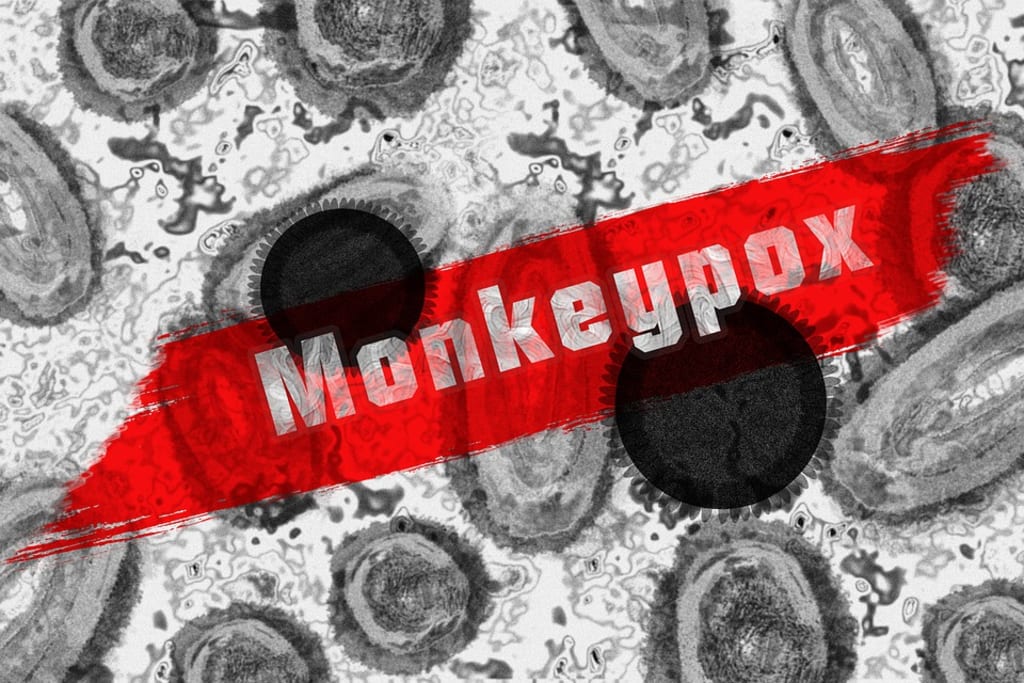The World Health Organization Makes Official Declaration That Monkeypox is an International Public Health Emergency
The Ultimate Question and Answer Guide

On Saturday, July 23rd 2022, the World Health Organization issued a Public Health Emergency of International Concern on the global outbreak and spread of the monkeypox virus. This was made due to the fact that the virus is rapidly spreading and it carries a significant risk of spread throughout the world.
As of the date of this writing, there are nearly 17,000 cases worldwide and nearly 3,000 cases within the United States. Here, we will outline essential information regarding the monkeypox virus, its symptoms, and why this is an illness of concern.
What is Monkeypox in Humans?
Monkeypox is a type of zoonotic disease that stems from a direct infection of the virus that is a member of the Orthopoxvirus genus. This is in the viral family of Poxviridae. This family of viruses includes smallpox – which is a variola virus – and cowpox – which is a vaccinia virus.
It has been scientifically identified as a double-stranded DNA-based virus that has the capability of replicating within the cytoplasm region of the cells of the host. Its clinical presentation is comparable to smallpox; however, in a significantly less severe basis.
How Does Monkeypox Spread?
As a zoonotic disease, the transmission of monkeypox is known to occur from certain types of animals directly to people. The most common animals that transmit the virus are rodents and primates. Monkeypox may also be spread from one human to another human.
Transmission is possible through the contact with fluids from the body, respiratory droplets, wounds on the surface of the skin, and internal mucosal surfaces. It has been found that contaminated objects may also result in the transmission of the monkeypox virus.
Individuals that consume meats that are infected and not completely cooked or other products that come from infected animals may contract the virus. Documentation has been noted on the transmission of the virus from a mother to an unborn child and from mother to child during and after the birthing process.
Anyone who comes into close contact with an individual or an animal that is infected with the monkeypox virus – be it healthcare workers or those that reside within the same household – are at high risk for contracting the infection.
Where Did Monkeypox Come From?
The very first case of the human-based monkeypox virus was found in the Democratic Republic of Congo in the year of 1970. To date, two varieties have been identified. The first is the Western African and the second is the Congo Basin or Central African. According to research, the Western African is the milder of the two in both symptoms and fatality rate.
The Central African has a higher rate of transmissibility among humans and the rate of fatality is stronger, ranking in at anywhere from 8% to 13%. The current outbreak – which has resulted in the recently announced Public Health Emergency by the WHO – is the West African virus.
Why is it Called Monkeypox?
In the year of 1958, there were two outbreaks of an illness that occurred among monkey colonies that were utilized for research purposes. These illnesses were distinct because of the fact that they both included symptoms that were similar to those in pox-like infections.
As a result of the circumstances surrounding the primates, the infection was referred to as “monkeypox”; however, it should be understood that the source behind the virus is still unknown. It has been established, though, that African rodents and primates that are non-human are believed to harbor this particular illness and pass it on to people.
What is a Poxvirus?
A poxvirus is one that has genomes that are large and include DNA that is double-stranded. They are shaped like a brick and may be oval. Poxviruses are capable of infecting various types of animals and humans. Infections will cause the development of nodules on the skin, the formation of potentially serious lesions, and may even cause a type of disseminated rash.
Poxviruses in people result from direct contact with animals, materials, objects, and other people that are infected or contaminated. While certain poxviruses – like smallpox – are no longer existent, others – such as the monkeypox virus – still exist and are currently spreading.
What are the Signs and Symptoms of Monkeypox?
There are multiple signs and symptoms of monkeypox. The most common include the following:
• Fever
• Chills
• Headache
• Backache
• Muscle Aches
• Swollen Lymph Nodes
• Exhaustion
• Evolving Rash
What Does Monkeypox Look Like?
In the previous section that outlined the signs and symptoms of monkeypox, the fact that an evolving rash occurs was outlined. In order to answer the above-question, a special emphasis must be placed on that rash. Skin eruption normally takes place in the span of 1-3 days after the start of a fever. In most instances, higher concentrations of the rash will be on the face and the extremities and not so much on the trunk.
In addition to the face, the rash may be on the palms of each of the hands, the soles of each of the feet, the membranes of the mouth, the genitalia region, and the eyes. In the earliest stages, the rash will develop into flat lesions and even slightly raised lesions that are relatively firm.
Then, the lesions will start to fill with a clear type of liquid. Eventually, pustules will develop. These are lesions that contain a yellowish substance. Finally, they will crust over, dry, and then fall off. There could be just a few lesions to an amount in the thousands.
How Long Does Monkeypox Last?
Monkeypox typically lasts anywhere from 2 weeks to 4 weeks. In most instances, the fever will make itself known before the development of the rash; however, there have been cases where the rash develops first and the remaining signs and symptoms of monkeypox occur afterwards.
If an individual has immune complications, poor health, or is being treated for more serious conditions – such as cancer – monkeypox may last longer and may develop into a more severe illness. In these cases, hospital treatment may be required.
Can You Die from Monkeypox?
Infections from the West African version of the monkeypox virus rarely result in death. According to statistics, over 99% of all infected with the virus that is resulting in the current public health emergency will survive. The Congo Basin monkeypox virus has an average fatality rate of 10%.
Is Monkeypox Serious?
Yes, it can be. It all depends on whether you get the West African type or the Congo Basin type. The latter is more serious. Individuals that have weakened immunity, eczema, are pregnant, are breastfeeding, or are under the age of 8 are at the highest risk for developing a serious illness and potentially dying from the West African virus. Regardless of type, the monkeypox virus is a very painful experience for sufferers and may result in permanent scarring to the body.
How Contagious is Monkeypox?
Historically, the human-to-human spread of the monkeypox virus has been very limited; however, in recent months, this has changed. It may be spread to any person of any age who comes into direct contact with the rash of the virus, bodily fluids, scabs, and the respiratory droplets of an infected individual.
It may also be spread by touching materials and/or objects that have come into contact with the virus. While transmission is occurring rapidly at this time, it is not as contagious nor does it spread as easily as other viruses – such as the influenza or the coronavirus that is responsible for causing COVID and its variants.
Can Monkeypox be Cured?
Monkeypox is a virus that results in disease in both animals and humans. There is currently no cure for the condition. There are antiviral drug treatments that may be effective in assisting in the treatment of the disease and the reduction in severity of the symptoms.
These antivirals have been created for treating smallpox, but have been found effective for monkeypox patients. These are available from the storage for protecting American public health, the Strategic National Stockpile (SNS):
1. Tecovirimat (TPOXX, ST-246)
2. Vaccinia Immune Globulin Intravenous (VIGIV)
3. Cidofovir (Vistide)
4. Brincidofovir (Tembex, CMX001)
Is There a Vaccine for the Monkeypox Virus?
Yes, there are vaccines that may help to protect against infections of the monkeypox virus. These were developed for smallpox; however, because of the genetic similarities of that virus and the monkeypox virus, they may be used to protect against infection. The two – which are stockpiled – are:
• JYNNEOS
• ACAM2000
Who is Eligible for the Monkeypox Vaccine?
In most cases, those that have been or may be exposed to the monkeypox virus are eligible to receive the vaccine. As the outbreak of the virus evolves, eligibility may change. Additionally, vaccine supply may have an impact on eligibility. Currently, it is being shipped to regions with high transmission rates and with populations that carry the highest risk for developing the disease. Contacting your doctor or health department is the best method for determining if you should obtain a vaccination.
Is the Monkeypox Virus a STD?
Monkeypox is not currently considered to be a STD; however, there is debate on whether or not it should be considered one given the fact that it is spread by close contact with the lesion the illness produces. What makes it different is that it is not passed strictly by only semen or vaginal-based fluids.
Additionally, a sexual act is not required for transmission. It is an infection that may affect any age group and in any setting. Close contact is required, but not with another person – with the virus, itself. It will likely never be considered a STD, though, sexual relations are a means of transmission.
Can Monkeypox Be Prevented?
To prevent becoming infected with the monkeypox virus, you may take the following steps:
1. You should avoid coming in skin-to-skin contact with those that have developed a rash. This includes avoiding hugging, cuddling, and other forms of intimacy. Additionally, bedding, towels, and clothing should not be touched nor should utensils and other items be shared with someone who may have the virus.
2. Hands should be washed frequently when soap and water. If unavailable, a hand sanitizer should be used that contains alcohol.
3. If you feel you have been in contact with someone or an animal that has the monkeypox virus, you should contact your doctor immediately.
What Should I Do If I am Diagnosed with Monkeypox?
If you have been diagnosed with the monkeypox virus, discuss possible treatments with your doctor and inquire about products that may ease the symptoms associated with the disease. Isolate at home to prevent the spread of the illness. If you live with others or have pets in the home, try to isolate from all – if it is possible.
Where Can I Find Out More About Monkeypox?
If you would like to know more about the monkeypox virus, you should contact your healthcare provider. You may also inquire at your local health department. On the websites of the World Health Organization and the CDC, there is a vast array of information concerning the illness.
Now that it has been declared a Public Health Emergency with International Concern, pay close attention to infections throughout your community and take the steps necessary to protect yourself, your loved ones, and your pets.
Thank you!
I thank you for reading this question-and-answer guide on the monkeypox virus. If you feel as if this article was well-researched and informative, I encourage you to like it below by clicking on the heart symbol. Please feel free to share it with others by clicking the Twitter and/or Facebook icons. Your support will help get this vital information in the hands of others and will help in the promotion of this content.
About the Creator
Angela Shiflett
Angela has worked as a professional content creator for nearly 20 years. Her topics are typically created as a result of her life experiences and passions. She strives to deliver content that is helpful, intriguing, and entertaining.






Comments
There are no comments for this story
Be the first to respond and start the conversation.